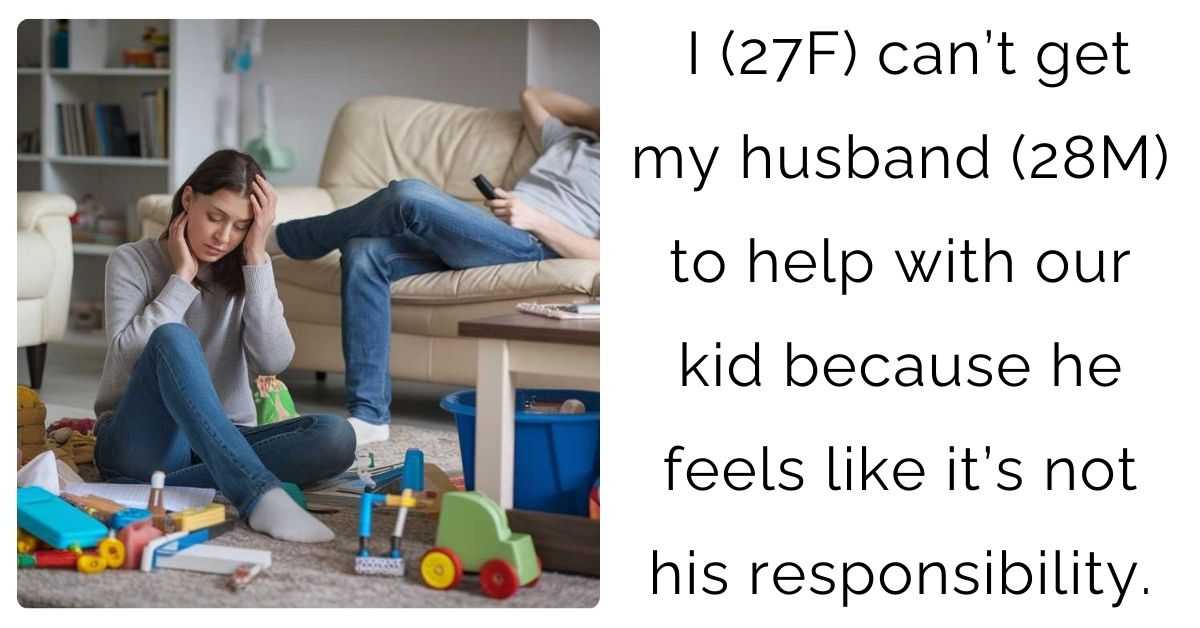I (27F) can’t get my husband (28M) to help with our kid because he feels like it’s not his responsibility.

Balancing work, parenting, and a partnership can sometimes feel like juggling flaming torches—especially when one partner isn’t pulling their weight. In this story, a 27-year-old woman recounts her struggles with her 28-year-old husband, who insists that providing financially absolves him of helping with their two-year-old daughter.
Despite both working full-time and contributing almost equally to the household income, he refuses to participate in basic childcare tasks like changing diapers or putting her daughter to bed. His outdated notion that his role as the “provider” exempts him from hands-on parenting has pushed her to a breaking point, especially when he even floated the idea of having another child.
Her frustration is palpable as she describes feeling overwhelmed by the daily demands of parenting while managing her career. With multiple attempts to address the imbalance falling on deaf ears, she’s now questioning whether this dynamic is sustainable—and whether it might be time to reevaluate the relationship entirely.

‘ I (27F) can’t get my husband (28M) to help with our kid because he feels like it’s not his responsibility.’
We’ve been together for 9 years, and married for 4 of them. We have a 2 year old daughter. Throughout the 2 years I can’t get him to help whatsoever. He’s never even changed a diaper, or even put her to bed. I have to do EVERYTHING. I’ve brought it up plenty of times but last week he mentioned wanting to have another kid and I lost my chill.
I told him I did not want any more kids just due to the fact that I have to do everything while he gets to do whatever. He told me that having kids is my duty as a woman and that since he is the “provider” he is not supposed to help out at all since he helps out money wise. I would agree to this, expect for the part that I also work 40 hrs a week. I make about 85K a year and he makes around 115K.
We have split finances, and we split the bills nearly 50/50. After bringing this up he still said he’s the main provider so it doesn’t matter. I don’t know what to do. He was an amazing boyfriend and a husband but I feel like I’m drowning in my own life everyday.
When one partner consistently shirks shared responsibilities, it can lead to significant marital strain. According to Dr. John Gottman, a renowned relationship researcher, “Effective partnerships require both partners to contribute emotionally, physically, and financially.
Neglecting any one aspect can create a rift that undermines trust and satisfaction in the relationship.” Dr. Gottman’s insights highlight that financial provision alone is not enough to sustain a family unit—active parenting and shared domestic duties are equally essential.
Dr. Gottman further explains, “When one partner is expected to manage everything, resentment builds over time. It’s critical for couples to have open, honest discussions about their expectations and responsibilities.”
In our OP’s case, her husband’s refusal to help with childcare, despite his claim of being the main provider, reflects a significant imbalance. His reliance on traditional gender roles only intensifies her feelings of isolation and burnout, as she juggles both a demanding career and full-time parenting.
Moreover, family therapist Dr. Susan Johnson adds, “When outdated gender norms dictate that one partner handles domestic duties while the other provides financially, it can lead to emotional exhaustion and a breakdown in the marital relationship.”
This dynamic not only affects the individual but also impacts the overall well-being of the family. Both experts agree that redefining roles and creating a fair division of labor is crucial. They advise that couples seek counseling to reestablish mutual respect and shared responsibility in parenting, ensuring that no one feels overwhelmed or undervalued.
Here’s the comments of Reddit users:
The Reddit community overwhelmingly criticizes the husband’s refusal to help with childcare. Many commenters point out that his role as “provider” should not exempt him from active parenting.
They argue that if he truly cared about his daughter, he’d contribute more than just money, highlighting that both partners work full-time and share nearly equal financial responsibilities. Several users passionately urge the OP to consider divorce, stating that his lack of engagement is not only unfair but also damaging to the family.
AnOutrageousCloud − Get a divorce. This is who he is. Reality doesn’t matter. As long as he has you, he isn’t going to parent.
deadletter − When you divorce he’s gonna learn what ‘half time parenting’ really is.
JuWoolfie − Call his bluff. Tell him you’re quitting your job so he can be ‘the provider’ and then take a week off to go find a divorce lawyer.. You cant fix stupid.
goodbye-toilet-cat − So his job is his work hours, and because you’re a woman and your salary is a statistically borderline meaningless percentage less than his, your job is your work hours plus 24/7 child rearing.
Lmao at him claiming to be the provider when you both work and make almost the same amount of money and pay the same amount of bills. What about any of this misogyny and selfishness and straight up LYING (he’s NOT “the main provider” by a long shot) is “amazing?”. Leave this man. Seriously.
AnythingButOlives − So…you work full time AND take care of your kid and house?? Leave this l**er! You’d be better off as it sounds like you’re already a single parent.
Edit: just noticed this gem “***that since he is the “provider” he is not supposed to help out at all since he helps out money wise***.” So he’s stupid too bc a provider means he’s fully funding the household. Don’t raise a kid with this dude.
delphine1041 − This man literally told you that he thinks he’s inherently worth more than you, and you’re just gonna try to work past that. Ew.
Extreme_Mixture_8702 − You are a single married mother. Please leave him, at least then you’ll get a break during his custodial time with your child.
redditlurker1981 − He’s not an amazing husband or partner. He needs a wake up call, instead of holding you to 80 year outdated b**lshit gender roles. If he brings up more kids remind him you already have two toddlers to raise, yours and the one his mother failed to properly raise. Or tell him if he’s the “provider” then you should get to quit your job and be a SAHM.
bullzeye1983 − It amazes me people write full paragraphs about the ridiculous behavior or attitude of a partner and then say how amazing they are as a spouse. No, not they aren’t. You literally just outlined why. Please reread your own post.
c8ball − So he wants a slave. Got it. Hey just a reminder, you don’t have to sacrifice your life to be with someone who won’t be a team with you. A marriage is a team, a partnership, and if he isn’t playing, neither should you.
At its core, this conflict is about the critical need for shared responsibility in parenting. While financial contribution is important, it doesn’t replace the emotional and physical presence a child requires. Our OP’s struggle reflects a broader issue of outdated gender roles and the damaging impact they can have on a relationship.
What do you think? Should both partners share the workload equally, regardless of income? Or is there a way to balance traditional roles with modern expectations? Share your thoughts and experiences in the comments below—how would you handle a situation where one partner refuses to share in the everyday responsibilities of raising a child?

